|
Almost Heroes - I
This feature discusses players whose feats were topped by another player in a crucial game.
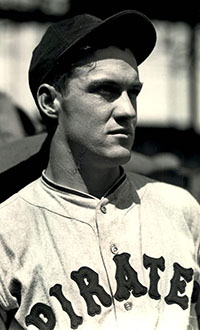 Arky Vaughan
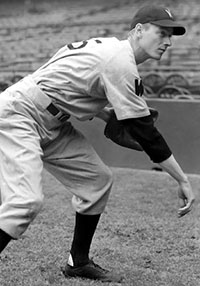
Sid Hudson
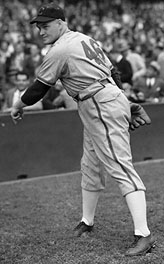
Eddie Smith
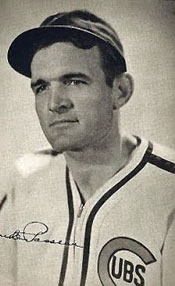 Claude Passeau
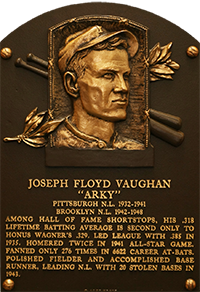
|
Arky Vaughan
Joseph Floyd "Arky" Vaughan fashioned a 14-year major league career that earned him election to the Hall of Fame by the Veterans Committee in 1985.
- His career statistics show why he was so honored: .318 batting average - second among all shortstops only to Honus Wagner's .327, 2103 hits, 1173 runs.
- He spent his first ten seasons (1932-41) with the Pirates.
- He finished up with the Brooklyn Dodgers 1942-43 and, after quitting baseball for three seasons, 1947-48.
- A left-handed batter, he hit .300 or better in every season except 1942 and his last one in 1948.
- He won the National League batting crown in 1935 with a .385 average. Retroactive calculations also show that he topped the circuit in On Base %, Slugging %, and, of course, On-Base-Plus-Slugging %. That was also the second of three straight years he stood atop the National League in walks.
- Arky led the league in runs scored three times: 1936, 1940, and 1943.
- He finished #1 in triples three times: 1933, 1937, and 1940.
- At age 35, he rejoined the Dodgers in 1947 and contributed to their pennant-winning season by hitting .325.
- Looking at these numbers, one wonders why he had to be elected by the Veterans Committee to make Cooperstown.
Vaughan made the All-Star team nine times. But the game that is the focus of this article was the 1941 midsummer classic at Briggs Stadium in Detroit.
- He started at short for the third straight season.
- The National Leaguers wanted to win badly since the American League had taken five of the first eight.
- Batting sixth in the National League lineup, Arky fouled out to left field against Bob Feller in the 2nd.
- In the top of the 5th, he singled on the infield against Thornton Lee of the White Sox.
- Two innings later, he clouted a delivery from Washington's Sid Hudson into the upper deck in right field with Enos Slaughter of the Cardinals on base to give the National League a 3-2 lead.
- In the next inning, facing southpaw Eddie Smith of the White Sox, Vaughan smacked another two-run shot that went even further into the upper deck than his previous blast to stretch the lead to 5-2.
- Dom DiMaggio's single drove in his brother Joe in the bottom of the 8th to make it 5-3.
You probably know what happened in the bottom of the 9th.
- With Claude Passeau of the Cubs pitching his third inning, Ken Keltner of Cleveland smashed a grounder than bounced off Vaughan's replacement, Eddie Miller of the Boston Braves, for a single with one out.
- The Yankees' Joe Gordon lined the first pitch into right center field for another one-base hit, Keltner stopping at 2nd.
- Cecil Travis of the Senators worked a walk to load the bases.
- That brought up Joltin' Joe, who had hit in 48 consecutive games going into the All-Star break and rapped a double earlier in the All-Star game. With the Detroit fans ready to anoint him their hero, Joe hit a grounder to Miller, who threw to Billy Herman of the Dodgers for the force at 2nd. But Herman threw wide to 1st to keep American League hopes as Keltner scored to make it 5-4.
You have quite a lineup when you can follow Joe DiMaggio with Ted Williams, who was also enjoying an epic season.
- Ted's batting average at that point was a cool .405. (He would finish at .406 for the last time a batter in either league has topped the .400 mark.)
- The Red Sox left fielder had a double and a walk earlier in the game.
- Ted launched the 2-1 pitch high off the front of the third deck of Briggs Stadium to give the American League a 7-5 victory.
- Just like that, Vaughan's heroics were forgotten.
Would Arky have made the Hall of Fame sooner if he had been the hero of the '41 All-Star Game instead of Ted Williams?
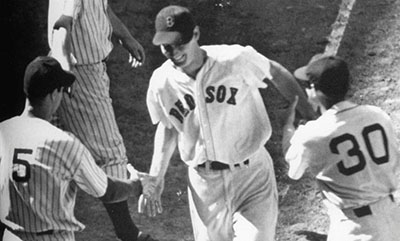
Ted Williams greeted at home plate by Joe DiMaggio (5) and the bat boy.
|
Don Newcombe had several close brushes with heroism, but something always seemed to deny him the laurels.
- As a 23-year-old rookie in 1949, Don won 17 and lost only eight to play a key role in the Dodgers' pennant by one game over the St. Louis Cardinals.
- Don beat the Phillies on Saturday, September 24, 8-1, to keep the Bums a half game behind the Redbirds.
- The following Thursday, he shut out the Boston Braves in the second game of a doubleheader to vault Brooklyn a half game ahead of the Cards. Played in the rain and mud, the contest was called after five innings.
- Manager Burt Shotton named Big Newk, who would win the Rookie of the Year Award, to open the World Series at Yankee Stadium.
- Don pitched masterfully, striking out 11 Yanks, walking none, and holding them to four hits through eight innings. Unfortunately, Allie Reynolds matched him goose egg for goose egg. Allie walked four but gave up only two hits.
- Just when it looked like the duel would go into extra innings, 1B Tommy Henrich clouted a fast ball into the right field bleachers to lead off the bottom of the ninth.
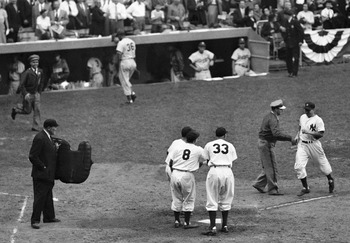
Newcombe walks to dugout after Tommy Henrich's homer won
Game 1 of the 1949 World Series.
The 1950 National League pennant race also went down to the final day.
- This time, the Dodgers' rival were Philadelphia's Whiz Kids who led by two games as they came to Brooklyn for a pair to end the season.
- Newcombe had gotten the final two outs against Boston the day before to save a crucial victory.
- The Bums won the first game against the Phils 7-3 to keep their hopes alive.
- Shotton sent Don to the hill to face Philly's ace Robin Roberts. Newk, seeking his 20th victory, pitched a marvelous game only to be matched by Roberts. As a result, the game went into extra innings tied 1-1. To show the difference between today's baseball and the habits of that era before The Closer became an essential position on each team, Shotton kept Newcombe on the mound to start the tenth. And it cost the Dodgers as Dick Sisler smacked a 3-run home run to seal the Phils' first pennant since 1915. Once again, Don pitched well in a pressure situation but didn't come out on top.
Unbelievably, the 1951 National League race was even tighter than the previous two, requiring 157 games to settle the issue.
- Newcombe won 20 games against 9 losses, leading the league in strikeouts with 164.
- In perhaps the most famous pennant competition in history, Brooklyn led the New York Giants by 13 on August 11. But, with the help of some sign-stealing by a spy in the scoreboard at the Polo Grounds, the Giants caught their hated cross-borough rivals on the last Friday of the season. They would have taken the lead by then except for two victories by Newcombe on the Wednesday and Saturday of the final week.
- The Giants won the first playoff game, but the Dodgers bounced back the next day to set up perhaps the most famous contest in major league history. Charlie Dressen, who took the reins of the Dodgers after Shotton's retirement, called on Big Don to face Giants' ace Sal Maglie.
- Once again, Newk rose to the occasion, taking a 4-1 lead into the bottom of the ninth. But, again, his manager didn't call on a fresh reliever to get the final three outs. Even after the first two Giants singled to open the inning, Dressen sat on his hands. With one out, Whitey Lockman's double finally impelled Charlie to turn to his bullpen. In as fateful decision as has ever been made on the diamond, he called on Ralph Branca to face Bobby Thomson with the tying runs on base.
- You know what happened next. Bobby hit "The Shot Heard 'Round the World." Once again, Newcombe saw victory snatched away from him.
Don fashioned an outstanding 10-season career, winning 149 against only 90 losses.
- However, he never won a post-season game, going 0-2 in the '49 Series, getting a no-decision in the '51 National League playoff, 0-1 in '55, and '01 in '56.
- It was his performance in the '56 World Series that cemented his reputation in the eyes of Dodger fans as a pitcher who "couldn't win the big one." After a marvelous 27-7 season that earned him both the National League Cy Young and MVP Awards (a first), Don got cuffed around by the Yankees in Game Two of the '56 Fall Classic to the tune of 6 runs in 1 2/3 innings. But he got a chance to redeem himself in Game 7 only to surrender 5 runs in three innings as the Yankees romped, 9-0.
After 1956, it was all downhill for Newcombe, thanks in large part to alcoholism.
- He fell to only 11 wins in '57, then 7 the next season before the Los Angeles Dodgers traded him to Cincinnati.
- Don bounced back with a 13-win campaign in '59 but, after winning only six games for the Reds and Indians in '60, retired.
We can only wonder whether a win in any of the post-season games he pitched would have changed Don's view of himself so that he could resist the allure of Demon Rum.
|
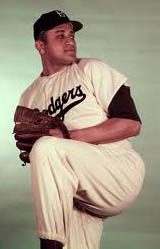 Don Newcombe
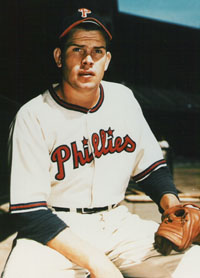
Robin Roberts
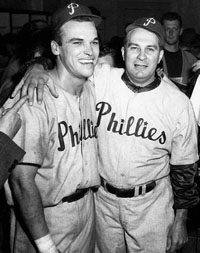
Dick Sisler with Manager Eddie Sawyer after clinching 1950 pennant for Phillies.
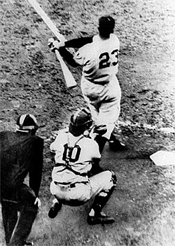
Bobby Thomson hits the
"Shot Heard 'Round the World"
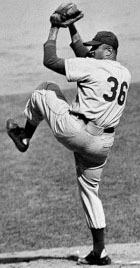
Newcombe in action at Yankee Stadium
Top of Page |
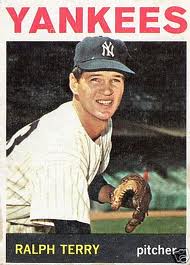
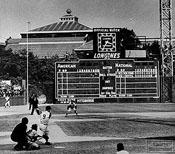
Bill Mazeroski hitting his historic home run
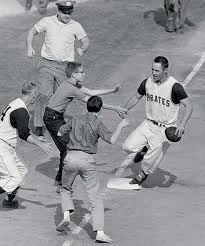
Mazeroski reaches home
|
"One of the most dramatic base hits in the history of the World Series ... That base hit will long be remembered."
- Those were the words of Hall of Fame broadcaster Mel Allen captured on the recently-discovered videotape of NBC's telecast of the seventh game of the 1960 World Series between the Pirates and Yankees. This game is famous, of course, for Bill Mazeroski's walkoff home run in the bottom of the ninth.
- But Mel was not referring to Maz's clout. Instead, he heaped praise on the three-run home run by PH Hal Smith in the previous inning to give the Pirates a 9-7 lead. Allen assumed that Smith's four-bagger would prove to be the game-winner.
However, the Yankees rallied in the ninth to tie the game. A key play involved Mickey Mantle's alert baserunning.
- With Mick on first and the tying run on third with one out, Rocky Nelson fielded Yogi Berra's hot smash and stepped on first.
- As Rocky whirled to throw to second for a double play, the Yanks center fielder, who hadn't strayed far from first because the ball had reached Nelson so quickly, dove back to the bag under Nelson's late tag.
- Actually, the tying run probably would have scored anyway if Mantle had run to second because, with the force removed at first, Mickey had to be tagged, and he would have been so far from second that the runner on third, Gil McDougall, would have scored before the third out was recorded.
- So Mickey took a chance by diving back into first. If Nelson had tagged him in time, the tying run would not have crossed the plate yet, and the game would have ended with Smith the hero and Mantle a goat.
Smith's home run had another impact on the ninth inning drama.
- It knocked out Jim Coates and brought in Ralph Terry from the bullpen.
- After recording the third out of the eighth, Terry took the mound in the ninth.
- Mazeroski hit his second pitch, a 1-0 fastball, over the left field wall to immortalize himself in Pirate lore.
Smith was certainly a hero in the Pirates' comeback from a 7-4 deficit but not the hero that everyone remembers. |
Brian Harper & Todd Worrell |
The sixth game of the 1985 World Series stood tied 0-0 in the top of the eighth inning.
- Playing without their leadoff man and sparkplug Vince Coleman, who was injured when the retractable tarpaulin at Busch Stadium had run over his leg before the fourth game of the National League Championship Series against the Dodgers, the Cardinals had scored only 12 runs in 52 innings in the Series to that point.
- Yet they had managed to take a 3-2 lead in games thanks to top-flight pitching. The Cardinals won the first two games of the Series 3-1 and 4-2 at Kansas City and the fourth game 3-0.
- Since no team had ever lost a World Series after winning the first two games in the opponent's ballpark, the odds favored St. Louis.
With runners on first and second and two out, Card manager Whitey Herzog sent little-used C Brian Harper up to pinch hit for P Danny Cox.
- Harper blooped a single into CF to score Terry Pendleton with the first run of the game. Brian said afterward, "I guess you could say it was my biggest hit ever."
- In fact, there was a strong possibility that it would be the game-winning hit in the clinching game for the Cardinals.
- After lefty Ken Dayley set down the Royals in the eighth, the Redbirds' chances increased even more. They were a perfect 88-0 for the season when leading after eight innings.
An insurance run in the ninth would have helped, but it was not to be.
- Herzog followed the pattern he had followed since August 28 that year. That was the day the 6'5" 215 lb Todd Worrell had joined the bulllpen.
- After seeing Todd's performance as a setup man for several weeks, Whitey installed him as his closer. The big righty garnered five saves from September 13 to the end of the season.
- So The White Rat didn't hesitate to summon the rookie to face the 5-6-7 batters in the KC lineup.
At that point, one of the most famous plays in World Series history occurred.
- PH Jorge Orta hit a slow roller that 1B Jack Clark fielded and tossed to Worrell covering. Replays showed that the throw clearly beat Orta and that Worrell's foot was on the bag. Yet Don Denkinger, the American League umpire at first, called the runner safe.
- A furious rhubarb ensued, with Herzog sprinting from the third base dugout to get between Clark and Denkinger.
- After several minutes of fruitless protest, Whitey returned to the dugout, and the game resumed with the tying run on first.
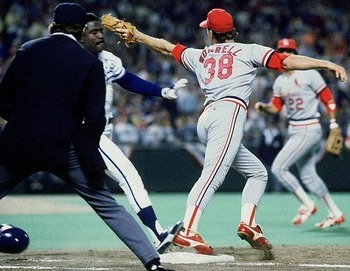 Orta called safe at first by Denkinger
Orta called safe at first by Denkinger
Matters went from bad to worse for the Cardinals.
- Steve Balboni hit a high popup that should have been caught by Clark. Whether he was still stewing about the blown call or not, Clark lost sight of the ball and let it fall. Instead of having two outs, the Cards had none. Years later, Jack said. "Darrell was calling for it. My thinking was to get over there in case there was a deflection like with [Pete] Rose [in the '80 World Series]. At the last minute he called, 'I don't have it.'"
- Given new life, Balboni singled to left field sending Orta to second. Onix Concepcion ran for the lumbering Balboni.
- Something finally went right for the Redbirds when C Jim Sundberg bunted, and Worrell fired to Pendleton to force Orta at third.
- However, with DH Hal McRae at the plate, Porter negated the good play by letting a slider get past him. The passed ball moved the tying run to third and the winning run to second. The Cardinals intentionally walked McRae to fill the bases.
- Dane Iorg stepped to the plate in place of P Dan Quisenberry. (The designated hitter was not yet allowed in the World Series.) Iorg had been a World Series hero for St. Louis in 1982, batting .529. Iorg explained afterwards: "It's a situation you dream about as a child. Coming to the plate in the bottom of the ninth with the bases loaded and the World Series on the line."
- Dane swung at Worrell's second pitch and hit a broken-bat blooper that dropped in front of Andy Van Slyke in right field. The tying run scored easily, and Sundberg raced toward home. He arrived just as Porter received Van Slyke's throw. As a catcher himself, Jim knew how to avoid a tag, and his head-first hook slide allowed him to brush his left hand across the plate just before the tag.
This Cardinal fan - and who knows how many others - didn't even bother to watch Game 7.
- Just the fact that they struggled to score runs dimmed their chances. As it turns out, they also had no fight left in them, reacting the way the Cubs always do to a setback. (Remember Moise Alou's temper tantrum when Steve Bartman kept him from catching the foul ball in Game 6 of the 2003 National League Championship Series?) Herzog set the tone when he told the umpires before the game, "We shouldn't even be out here tonight. You know you blew that call."
- The result was an ugly 11-0 KC romp, with Herzog and starter Joaquin Andujar thrown out by Denkinger, who was behind the plate.
- Myself, I think of the 1985 World Championship as God's gift to Dick Howser, the Royals manager and my fellow Florida State Seminole, who would die from a brain tumor less than two years later.
At any rate, the memorable names after Game Six were Denkinger and Iorg, not Harper and Worrell.
Reference: You Lose Some, You Lose Some: Eric Furman & Lou Henry (2004)
Top of Page |
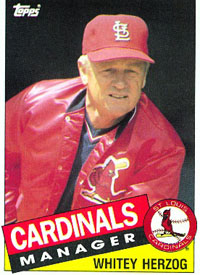 Whitey Herzog
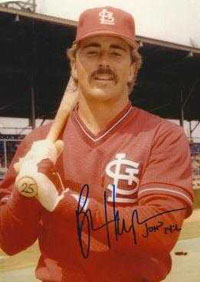
Brian Harper
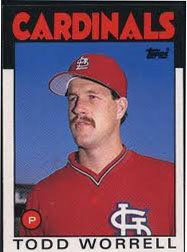
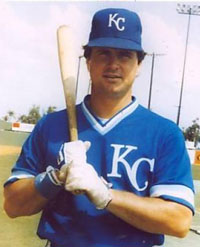
Jim Sundberg
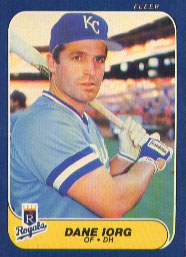
|
|
|
Dave Henderson and Marty Barrett
As the Red Sox, leading the 1986 World Series three-games-to-two, took the field for the bottom of the tenth at Shea Stadium in the sixth game, two of their fielders felt particularly good.
The first was CF Dave Henderson.
- Dave led off the top of the tenth with a high fly down the left field line that put the Sox up 4-3 over the Mets.
- The circuit clout, his second of the series, gave him 10 hits in 23 at-bats for a whopping .435 average. He also had 5 RBIs.
- Red Sox Nation already revered Henderson for his two-out, two-strike home run in the top of the ninth in Game 5 of the American League Championship Series that staved off defeat to allow Boston to rally from a three-games-to-one deficit to snatch the American League pennant from the California Angels.
The second was 2B Marty Barrett.
- Marty drove in an insurance run with a single following Wade Boggs' two-out double in the top of the tenth.
- Barrett had hit a solid .286 during the season.
- But he had been red hot during the Series. His average stood at .480 (12-for-25), with four RBIs and five walks.
Each had every right to expect heroes' status for contributing to Boston's first World Series championship since 1918, especially when reliever Calvin Schiraldi retired the first two batters in the bottom of the inning. Alas, we know what happened next.
- C Gary Carter singled to left field.
- PH Kevin Mitchell followed with a soft line single to center field.
- 3B Ray Knight lined another single, this one to right-centerfield, scoring Carter and sending Mitchell to third.
At that point, Sox Manager John McNamara brought in Bob Stanley.
- With two gone, all Stanley had to do was retire LF Mookie Wilson and The Curse of the Bambino was history.
- Instead, Bob uncorked a wild pitch. Mitchell scored the tying run, and Knight advanced to second.
- Mookie then hit the most famous slow roller in baseball history. The ball dribbled down the first base line through the legs of Bill Buckner for an error that allowed Knight to score the winning run.
Given new life, New York took Game Seven to once again deny Boston fans their jubilation.
- Henderson's and Barrett's heroics are forgotten. Instead, Buckner's name is the one most associated with the 1986 collapse.
- Instead of being acclaimed as the skipper who finally brought the world championship back to Boston, McNamara ranks as one of the biggest goats in Sox history for leaving Schiraldi in too long, not removing Buckner for a defensive replacement, etc.
|
|
CONTENTS
Arky Vaughn
Don Newcombe
Hal Smith
Brian Harper, Todd Worrell
Dave Henderson, Marty Barrett
Baseball
Magazine
Top of Page |